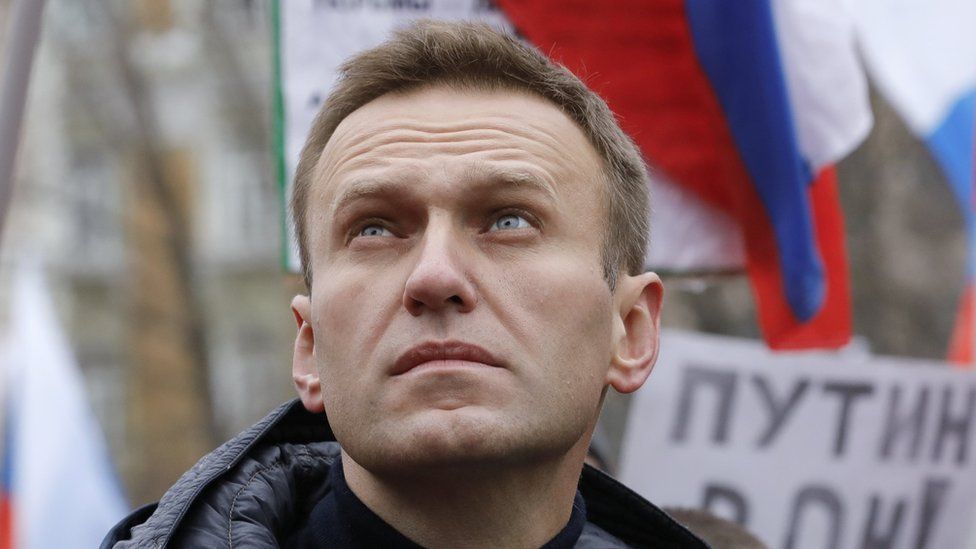It’s easy to dump on Jeff Zucker, the former head of NBC and CNN and more.
But let’s look at something that has turned out well: Under Zucker, CNN developed a strong lineup of shows on Saturday and Sunday nights; that’s clear now, with:
–Sundays: “Stanley Tucci: Searching for Italy” has just started its second season. Barring breaking news, it’s at 9 p.m. and midnight, with another travel-and-food show (“Nomad with Carlton McCoy”) at 10 and 1, plus a Tucci rerun at 11.
— Saturday, May 14: “Navalny” (shown here), a compelling documentary movie, reruns from 9-11 p.m., followed by Tucci and McCoy reruns. It had been set for May 7, but then was pushed back.
Those two nights have almost nothing in common. (Tucci meets gracious people in gorgeous places; Alexei Navalny is a Russian dissident who survived an assassination attempt, then returned home and was imprisoned.) But both are well-made and fit alongside the usual news shows.
The CNN series tend to be lightly pleasant, with lots of clips and talking heads. Some involved personalities – lately including Lyndon Johnson, Queen Elizabeth, Diana, Marilyn Monroe and the First Ladies — and others captured pop culture. There have been series about the decades (‘50s, ‘60s, etc.) and comedy and latenight-TV and more. Most are competent; some – including Anthony Bourdain’s brilliant “Parts Unknown” and Tucci’s Italian jaunt – have been much more.
But the documentary movies are what really stand out. The CNN Films unit was created a decade ago. The next year, after Zucker arrived, it became a busy force, buying some finished films and producing others. The first was an interesting profile of provocative TV host Morton Downey Jr.; the third, “Blackfish,” was a fierce indictment of SeaWorld and the notion of captive whales.
Those reflect the 50 CNN films that have aired so far. There are vivid portraits of entertainers – Gilda Rader, Glen Campbell (struggling with Alzheimer’s), Carole King and James Taylor (mostly in concert, writer Jackie Collins) … chefs (Bourdain, Julia Child, Jeremiah Tower) … people encased in the news (John Lewis, Steve Jobs, Elian Gonzalez, an upcoming film on Gaby Giffords and a superb portrait of Ruth Bader Ginsburg) and others, including critic Roger Ebert and tennis star Arthur Ashe.
But many fascinating films went in other directions. There was history (Apollo 11, the Tulsa massacre). And two films about movements – a cult and an “enlightenment” retreat – gone bad. And an intriguing oddity about the discovery of a consummate dinosaur fossil in South Dakota, spurring a decade of legal battles. And “Three Identical Strangers,” the wondrous story of three men raised separately, unaware that they were triplets.
Many of these have been deeply involving – as is “Navalny.”
This starts with advantages: Alexei Navalny has likability (something we don’t always expect from a lawyer) and humor (something we never expect from a Russian politician). He’s photogenic, as are his wife and their daughter, a Stanford student. And he has the ultimate antagonist – Vladimir Putin. After Navalny began speaking against Putin, he barely survived a poisoning.
That’s where the film starts. Navalny marvels that an assassination attempt failed … and that it used the same technique that had been used on a previous Russian dissident. He prepares to return home, facing the possibility of imprisonment or more.
He gets remarkable help – including a computer whiz who figures out which people are likely to have been directly involved with the poisoning. That leads to the moment when Navalny cold-calls one of the men (at home, recovering from Covid), pretending to be a Kremlin official. He emerges with a virtual confession, complete with details.
It’s an amazing moment – one of many that have surged during (and after) Jeff Zucker’s CNN years.
